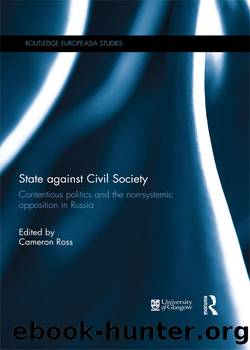State Against Civil Society: Contentious Politics and the Non-Systemic Opposition in Russia by Cameron Ross

Author:Cameron Ross [Ross, Cameron]
Language: eng
Format: epub
ISBN: 9781138926301
Google: qcEErgEACAAJ
Goodreads: 26408148
Publisher: Routledge
Published: 2015-08-13T14:02:13+00:00
Modernity and Russia: an uneasy relationship?
The philosophical matrix that evolves as a result of debates on the nature of modernity becomes the keystone of Russiaâs civic debates, marking a watershed between traditionalistâconservatives and liberals. Interestingly, all participants of the debate, from the liberal to traditionalistâconservative spectrum of left and right, agree that Russia follows a special path towards modernity that is divergent from the West. Yet, this path is narrated and assessed differently. While both conservatives and liberals agree that modernity has not occurred in Russia âproperlyâ, in the Western understanding of the term, they disagree on what Russia is to do about this. Likewise, the attitudes and appreciation of the nature of Western modernity and the post-modern world by Russian liberals and conservatives is starkly different. This leads to different proposals on the nature of Russiaâs developmental trajectory.
Russian liberals understand modernity in line with its various Western observers as a political and economic project that âreflects growth-oriented planning and production, a pluralist political system, in which class politics is replaced by interest-group struggles, with a strong bureaucracy that can regulate relations among, and between, money and human capitalâ (Aronowitz 1988, p. 46). These thinkers and activists feel that the modernity project in Russia has been crippled and that the country should struggle to implement this project, fully setting such a goal as the main objective for the countryâs future. Vadim Mezhuev, chief researcher at the Moscow Institute of Philosophy (RAN), insists that âone cannot talk about Russiaâs modernity in any meaningful manner in that modernity implies civil society, citizens, and a legitimate state that guarantees equal opportunities and justice for all. None of that has been realised in Russia at any time of her modern historyâ (Tretyakov 2005). Thus, to Mezhuev and to most of his liberally minded colleagues, Russiaâs priority lies in building these fundamental elements of modernity before logically proceeding to the progressive post-modern age. Post-modernism in this case is welcomed as a finalisation of modernityâs fundamental endeavour to grant âjustice and equality to allâ (Aronowitz 1988, p. 47) and as a logical extension of its socio-cultural paradigm. âSince I live in Russiaâ, claims Mezhuev, âI am a devout modernist, but if I were to live in the United States, I would have stood with the post-modernist positionsâ (Tretyakov 2009).
For Russian liberals, post-modernityâs main attraction lies in its emphasis on a multiplicity of norms, forms, cultures, discourses, and lifestyles, as well as the absence of universal ambitions of modernityâs main ideologies. The absence of meta-narratives, liberals claim, provides multitudes of new opportunities and changes a single-dimensional matrix of the real life-world. Meta-narratives must finally give way to particular, personal narratives of each individual man (Tretyakov et al. 2005). It is from this point of view that Irina Prokhorova, a founding member of the Civic Platform (Grazhdanskaya Platforma) political party and the editor-in-chief of the New Literary Review (Novoe Literaturnoe Obozrenie), praises post-modernism as an era of peace, toleration, and opportunity, to which Russia should strive after it has dealt with constructing modernity in the Western fashion.
Download
This site does not store any files on its server. We only index and link to content provided by other sites. Please contact the content providers to delete copyright contents if any and email us, we'll remove relevant links or contents immediately.
Man-made Catastrophes and Risk Information Concealment by Dmitry Chernov & Didier Sornette(6005)
The Revenge of Geography: What the Map Tells Us About Coming Conflicts and the Battle Against Fate by Kaplan Robert D(4066)
Zero Waste Home by Bea Johnson(3833)
COSMOS by Carl Sagan(3617)
Good by S. Walden(3548)
In a Sunburned Country by Bill Bryson(3537)
The Fate of Rome: Climate, Disease, and the End of an Empire (The Princeton History of the Ancient World) by Kyle Harper(3055)
A Wilder Time by William E. Glassley(2858)
Camino Island by John Grisham(2794)
Organic Mushroom Farming and Mycoremediation by Tradd Cotter(2688)
The Ogre by Doug Scott(2679)
Human Dynamics Research in Smart and Connected Communities by Shih-Lung Shaw & Daniel Sui(2500)
Energy Myths and Realities by Vaclav Smil(2487)
The Traveler's Gift by Andy Andrews(2457)
9781803241661-PYTHON FOR ARCGIS PRO by Unknown(2365)
Inside the Middle East by Avi Melamed(2352)
Birds of New Guinea by Pratt Thane K.; Beehler Bruce M.; Anderton John C(2251)
A History of Warfare by John Keegan(2240)
And the Band Played On by Randy Shilts(2197)
